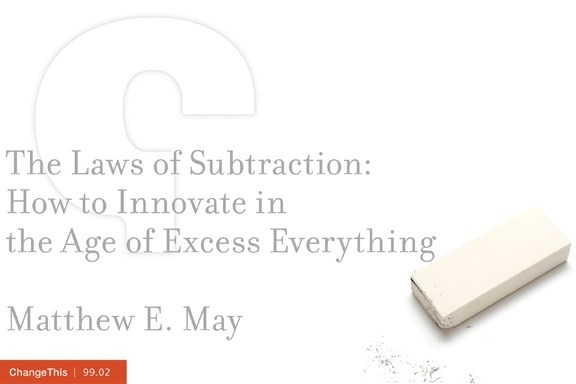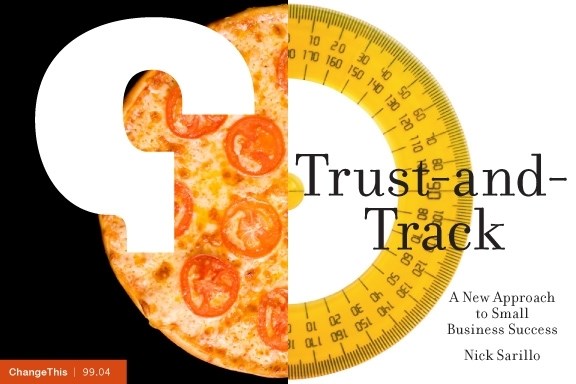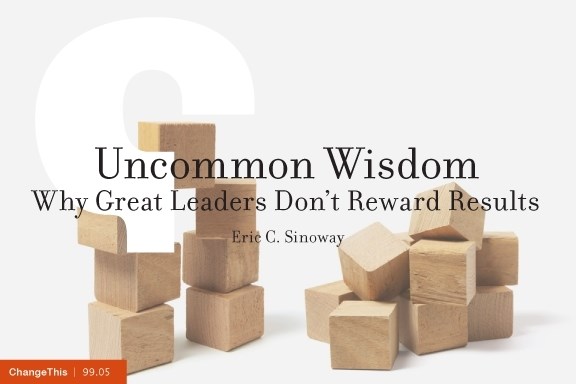ChangeThis RSS
"Our businesses are more complicated and difficult to manage than ever. Our economy is more uncertain than ever. Our resources are scarcer than ever. There is endless choice and feature overkill in all but the best experiences. Everybody knows everything about us. The simple life is a thing of the past. Everywhere, there's too much of the wrong stuff, and not enough of the right. The noise is deafening, the signal weak. Everything is too complicated and time-sucking.
Welcome to the age of excess everything. Success in this new age looks different, and demands a new and singular skill: Subtraction.
Subtraction is defined simply as the art of removing anything excessive, confusing, wasteful, unnatural, hazardous, hard to use, or ugly—and the discipline to refrain from adding it in the first place."
Continue reading
"The moon has risen. You and your family and friends are gathered around the fire, deciding who will be your next chieftain. Your former leader has died in battle, and this is a solemn and important occasion. The adults speak quietly, the firelight flickering over their faces, while the children and adolescents listen to every word. [...]
This is the most important decision the tribe can make: choose badly, and they could all starve to death, or be overrun by an invading enemy. Choose well, and they can hope for safety, freedom, a measure of prosperity. The discussion continues far into the night.
[...] Our deeply-wired-in sense of what makes a good leader is still there. You can see it every day in how we respond to the leaders in our organizations. Some leaders are merely "appointed": they may have the title and the corner office, but people simply don't commit to them. They have employees, but they don't have followers.
Then there are what I call "accepted" leaders. Sometimes they don't even have the external signs of leadership—they may not have the top job or the big paycheck, but people gravitate toward them. People want to work for and with them; teams coalesce around them and achieve great things.
What's the difference?"
Continue reading
"We all know bosses who adopt a rigid, rule-bound, Command-and-Control approach to management. But do we love them? Will we move heaven and earth to achieve superior performance for them and the company? Will we put our heart into our work even when these bosses don't happen to be standing over us?
My two Nick's Pizza and Pub restaurants in suburban Chicago are among the top ten busiest independent pizza chains in the United States, as measured in per-unit sales. Our margins are often twice those of the average pizza joint, while employee turnover is less than 20% per year in an industry that averages 150%. My employees do love to come to work—and it shows, each and every day.
I didn't get numbers like that or the love of my employees by dictating their every behavior, insisting things be done my way, and punishing them when they go astray. You won't find any surveillance cameras in my restaurants—although many people tried to sell me them when I first opened, and friends and associates told me I needed them. You sometimes won't even find a manager supervising our team members during a shift. (Yes, you read that right, no managers!). What you will find is a culture of trust in which everyone—from the most junior team-member on up—strives every day to do their very best, and has fun doing it.
[...] If I can stop policing my workforce of sixteen and seventeen year-olds—not normally considered the most motivated and trustworthy of employees—and achieve world-class results, just think what you can accomplish in your business."
Continue reading
"In today's economic environment—where most of us, even those who are succeeding—face pressure and uncertainty in our business, there's an increasing emphasis on rewarding results. And why shouldn't there be? Why shouldn't we disproportionately direct praise, resources, and rewards to those who produce bottom line results? The answer is that—in the long run—doing so may empower lesser-valued employees, punish our future stars, and undermine the most valuable organizational asset, a company's culture. The framework of this manifesto will help managers and leaders identify the employees who represent the future of their business, and it will help them spot and eliminate the organizational vampires that may kill it."
Continue reading
"We live in a world that has lost its connection to its traditional myths, and we are now trying to find new ones—we're people, and that's what people without myths do. These myths will shape our future, how we live, what we do, and what we buy. They will touch all of us But not all of us get to write them. Those who do have tremendous power.
And where there is power, there is struggle for it. That's why, just below the surface, just beyond what the uninitiated can see, there are wars going on. The soldiers at are Tea Party demonstrators and champions of "the 99 percent," climate change activists, makers of computers and sneaker brands. They seem to be fighting over ideas and dollars, but they are really fighting for control of our stories."
Continue reading










